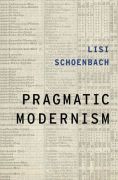
Pragmatic Modernism traces an alternative strain of modernism influenced by pragmatist philosophy and characterized by its commitment to gradualism, continuity, and habit rather than spectacular events and radical rupture. Through original readings of Gertrude Stein, Henry James, Marcel Proust, and Oliver Wendell Holmes, Jr., this study rediscovers an overlooked cultural and social matrix and suggests an expanded range of responses to modernity. Modernism has long been understood as a radical repudiation of the past. Reading against the narrative of modernism-as-break, Pragmatic Modernism traces an alternative strain of modernist thought that grows out of pragmatist philosophy and is characterized by its commitment to gradualism, continuity, and recontextualization. It rediscovers a distinctive response to the social, intellectual, and artistictransformations of modernity in the work of Henry James, Marcel Proust,Gertrude Stein, Oliver Wendell Holmes, John Dewey, and William James. These thinkers share an institutionally-grounded approach to change which emphasizes habits, continuities, and daily life over spectacular events, heroic opposition, and radical rupture.Pragmatic modernists developed an active, dialectical approach to habit, maintaining a critical stance toward mindless repetitions while refusing to romanticize moments of shock or conflict. Through its analysis of pragmatist keywords, including "habit," "institution," "prediction," and "bigness," Pragmatic Modernism offers new readings of works by James, Proust, Stein, and Andre Breton, among others. It shows, for instance, how Stein's characteristic literary innovation--herrepetitions--aesthetically materialize the problem of habit; and how institutions--businesses, museums, newspapers, the law, and even the state itself--help to construct the subtlest of personal observations and private gestures in James's novels. This study reconstructs an overlooked strain of modernism. In sodoing, it helps us to reimagine the stark choice between political quietism and total revolution that has been handed down to us as modernism's legacy. ContentsSeries Editors' ForewordIntroduction: Pragmatic ModernismPart I. Habit1. Modernist Habit2."Peaceful and Exciting":Habit, Shock, and Gertrude Stein's Pragmatic ModernismPart II. InstitutionsInterlude: Jamesian Institutions3. Prediction Theories:"The Path of the Law" The Wings of the Dove,and the Engagement with Temporality4. A Jamesian State:The American Scene and <"the Working of Democratic Institutions>"Epilogue:Proustian Habit and Pragmatic ModernismBibliographyIndex
- ISBN: 978-0-19-538984-5
- Editorial: Oxford University
- Encuadernacion: Cartoné
- Páginas: 224
- Fecha Publicación: 08/12/2011
- Nº Volúmenes: 1
- Idioma: Inglés
